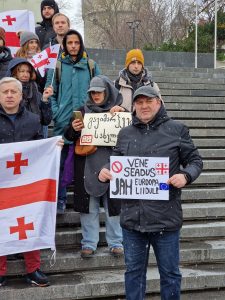On April 20, Georgian citizens living in Tallinn, Estonia held a protest rally against the controversial bill “on transparency of foreign influence,” which sparked mass-protests in Tbilisi.
The protesters gathered at the Freedom Square in Tallinn with the pro-European banners and condemned the draft law, which, according to them, distances Georgia from the European family and draws it back to Russia.
“Georgia has been a candidate country for joining the EU since December 2023. The adoption of this law clarifies whether the pro-Russian government of Georgia intends to move closer to Western democracies or Russia,” the event page of the protesters reads.

One of the organizers of the protest, Tekla Qveladze, says the adoption of the Russian law is not only directed against the non-governmental sector and critical media, but it primarily threatens the population of Georgia both inside and outside the country.
“Russian law is not the choice of Georgia, and we fight for it for decades and its adoption will be an attack against the main Georgian values, dignity, independence and civil solidarity…This law will also seriously harm Georgia’s euro integration process and hinder Georgia’s path towards the EU membership,” she stated during the rally.
Another protest organizer and English language teacher in Tallinn, Vako Goguadze explained that everyone should unite against the suggested bill, because it deprives the youth of a better, free and European future.
“One day when I decide to go back home, I don’t want to return to a Soviet Georgia and to soviet-style schools. I don’t want to work for such a state where the government has pro-Russian course,” he added.

The controversial bill was submitted to the Parliament of Georgia on April 3 by the ruling Georgian Dream party and adopted by the majority MPs on April 17 with the first reading. 83 out of 150 MPs voted in favor of the bill, while opposition parliamentarians boycotted the vote. It must pass two more readings before becoming law. The draft makes it mandatory for non-commercial legal entities and media outlets in Georgia that receive over 20% of their funding from abroad to register as organizations “pursuing the interests of a foreign power.”
The adoption of a similar law in Russia completely wiped out non-governmental sector and free media organizations. The Kremlin gradually tightened the law, which now also spreads to any physical person or people who receive income from abroad in any form.
By Tea Mariamidze
Photo source: Tea Mariamidze














